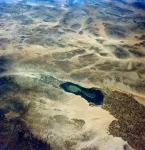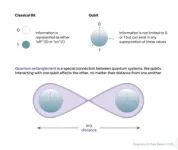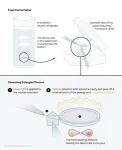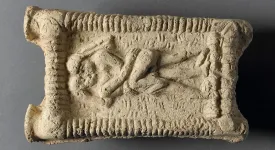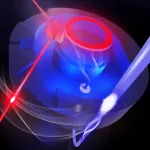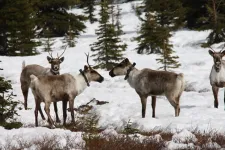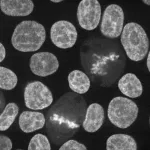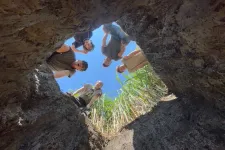(Press-News.org) More than 50 percent of the largest lakes in the world are losing water, according to a groundbreaking new assessment published today in Science . The key culprits are not surprising: warming climate and unsustainable human consumption.
But lead author Fangfang Yao, a CIRES visiting fellow, now a climate fellow at University of Virginia, said the news is not entirely bleak. With this new method of tracking lake water storage trends and the reasons behind them, scientists can give water managers and communities insight into how to better protect critical sources of water and important regional ecosystems.
“This is the first comprehensive assessment of trends and drivers of global lake water storage variability based on an array of satellites and models,” Yao said.
He was motivated to do the research by the environmental crises in some of Earth's largest water bodies, such as the drying of the Aral Sea between Kazakhstan and Uzbekistan.
So he and colleagues from the University of Colorado Boulder, Kansas State University, France, and Saudi Arabia created a technique to measure changes in water levels in nearly 2,000 of the world’s biggest lakes and reservoirs, which represent 95 percent of the total lake water storage on Earth.
The team combined three decades of observations from an array of satellites with models to quantify and attribute trends in lake storage globally.
Globally, freshwater lakes and reservoirs store 87 percent of the planet's water, making them a valuable resource for both human and Earth ecosystems. Unlike rivers, lakes are not well monitored, yet they provide water for a large part of humanity – even more than rivers.
But despite their value, long-term trends and changes to water levels have been largely unknown – until now.
“We have pretty good information on iconic lakes like Caspian Sea, Aral Sea and Salton Sea, but if you want to say something on a global scale, you need reliable estimates of lake levels and volume,” said Balaji Rajagopalan, a CIRES fellow, professor of engineering at CU Boulder, and co-author. “With this novel method …we are able to provide insights into global lake level changes with a broader perspective.”
For the new paper, the team used 250,000 lake-area snapshots captured by satellites between 1992-2020 to survey the area of 1,972 of Earth’s biggest lakes. They collected water levels from nine satellite altimeters and used long-term water levels to reduce any uncertainty. For lakes without a long-term level record, they used recent water measurements made by newer instruments on satellites. Combining recent level measurements with longer-term area measurements allowed scientists to reconstruct the volume of lakes dating back decades.
The results were staggering: 53 percent of lakes globally experienced a decline in water storage. The authors compare this loss with the magnitude of 17 Lake Meads, the largest reservoir in the United States.
To explain the trends in natural lakes, the team leveraged recent advancements in water use and climate modeling. Climate change and human water consumption dominated the global net decline in natural lake volume and water losses in about 100 large lakes, Yao said. “And many of the human and climate change footprints on lake water losses were previously unknown, such as the desiccations of Lake Good-e-Zareh in Afghanistan and Lake Mar Chiquita in Argentina.”
Lakes in both dry and wet areas of the world are losing volume. The losses in humid tropical lakes and Arctic lakes indicate more widespread drying trends than previously understood.
Yao and his colleagues also assessed storage trends in reservoirs. They found that nearly two-thirds of Earth’s large reservoirs experienced significant water losses.
“Sedimentation dominated the global storage decline in existing reservoirs,” said Ben Livneh, also a co-author, CIRES fellow, and associate professor of engineering at CU Boulder. In long-established reservoirs—those that filled before 1992—sedimentation was more important than droughts and heavy rainfall years.
While the majority of global lakes are shrinking, 24 percent saw significant increases in water storage. Growing lakes tend to be in underpopulated areas in the inner Tibetan Plateau and Northern Great Plains of North America and in areas with new reservoirs such as the Yangtze, Mekong, and Nile river basins.
The authors estimate roughly one-quarter of the world’s population, 2 billion people, resides in the basin of a drying lake, indicating an urgent need to incorporate human consumption, climate change, and sedimentation impacts into sustainable water resources management.
And their research offers insight into possible solutions, Livneh said. “If human consumption is a large factor in lake water storage decline, then we can adapt and explore new policies to reduce large-scale declines.”
This happened in one of the lakes the team studied, Lake Sevan in Armenia. Lake Sevan has seen an increase in water storage, in the last 20 years, which the authors linked to enforcement of conservation laws on water withdrawal since the early 2000s.
For an interactive map illustrating the findings, click here.
END
Half of world's largest lakes losing water
Climate change, human consumption and sedimentation contributing to decline
2023-05-18
ELSE PRESS RELEASES FROM THIS DATE:
Humanity’s earliest recorded kiss occurred in Mesopotamia 4,500 years ago
2023-05-18
Recent research has hypothesised that the earliest evidence of human lip kissing originated in a very specific geographical location in South Asia 3,500 years ago, from where it may have spread to other regions, simultaneously accelerating the spread of the herpes simplex virus 1.
But according to Dr Troels Pank Arbøll and Dr Sophie Lund Rasmussen, who in a new article in the journal Science draw on a range of written sources from the earliest Mesopotamian societies, kissing was already a well-established ...
Wiring up quantum circuits with light
2023-05-18
Quantum computers promise to solve challenging tasks in material science and cryptography that will remain out of reach even for the most powerful conventional supercomputers in the future. Yet, this will likely require millions of high-quality qubits due to the required error correction.
Progress in superconducting processors advances quickly with a current qubit count in the few hundreds. The advantages of this technology are the fast computing speed and its compatibility with microchip fabrication, but the need for ultra-cold temperatures ultimately confines the processor in size and prevents any physical ...
Call for Canada, US to braid Indigenous rights, endangered species laws
2023-05-18
Climbing caribou numbers in northeastern British Columbia prove that collaborations between Indigenous and colonial governments can reverse decades-long declines, but focus needs to shift to culturally meaningful recovery targets, a consortium of researchers and community members say in a new paper published this week in Science.
UBC Okanagan’s Dr. Clayton Lamb and West Moberly First Nation Chief Roland Willson co-lead the paper, Braiding Indigenous Rights and Endangered Species Law, alongside nine others for the influential journal.
“Abundance matters. There are many cases where endangered species laws have prevented extinction, but the warning signs ...
Rising rates of induced labor need to be reconsidered in the context of the UK maternity services staffing crisis, study suggests
2023-05-18
A new study suggests that increasing rates of induction of labour (IOL) of pregnant women and people in the UK, without considering the accompanying, real-world impact on staffing workloads and patient care, may have unintended consequences.
The study from City, University of London, the University of Edinburgh and others highlights the limited evidence around the delivery of home-based IOL services, which were seen as an important step to reducing maternity staff workload.
It finds large gaps in knowledge on how to deliver home-based ...
Disentanglement——breaking the activity-selectivity “tradeoff” effect in catalytic conversion
2023-05-18
Researchers have reported a strategy to disentangle the activity-selectivity tradeoff for direct conversion of syngas, a mixture of carbon monoxide and hydrogen, into desirable ethylene, propylene, and butylene. These hydrocarbons are known as light olefins and are the most-used building blocks for plastics.
“Activity and selectivity are two primary indexes of a successful catalyst for chemical reactions. A higher activity means higher efficiency in converting feedstock to products, thereby reducing energy consumption,” said JIAO Feng, an associate professor at the ...
Perfection: The Enemy of Evolution
2023-05-18
DURHAM, N.C. -- Scientists are often trained to seek out the absolute best solution to a given problem. On a chalk board, this might look something like drawing a graph to find a function’s minimum or maximum point. When designing a turbojet engine, it might mean tweaking the rotor blades’ angles a tiny degree to achieve a tenth of a percent increase in efficiency.
Adrian Bejan, the J.A. Jones Distinguished Professor of Mechanical Engineering at Duke University, was busy demonstrating the former for a class full of students ...
From Seattle to space: Science that began at the Allen Institute blasts off to International Space Station
2023-05-18
SEATTLE — May 18, 2023 — This Sunday (May 21) at 2:37 p.m. PDT1, astronauts from Axiom Space in partnership with Cedars-Sinai will blast off to the International Space Station carrying cells from the Allen Institute for Cell Science, a division of the Allen Institute. There, Axiom Space astronauts will perform experiments and send real-time data back to researchers at Cedars-Sinai as part of their study on the effects of microgravity on human cells.
The experiments are part of the Ax-2 mission, funded by NASA and ...
Award to lay new ground for information extraction without relying on humans
2023-05-18
Considering the millions of research papers and reports from open domains such as biomedicine, agriculture, and manufacturing, it is humanly impossible to keep up with all the findings.
Constantly emerging world events present a similar challenge because they are difficult to track and even harder to analyze without looking into thousands of articles.
To address the problem of relying on human effort in situations such as these, Lifu Huang, an assistant professor in the Department of Computer Science and core faculty at the Sanghani Center for Artificial Intelligence and Data Analytics, is researching how machine learning can extract information without ...
Children’s Hospital Colorado Electron Microscopy Lab receives prestigious accreditation as Diagnostic Center for Primary Ciliary Dyskinesia (PCD)
2023-05-18
Aurora, Colo. (May 18, 2023) – Children’s Hospital Colorado (Children’s Colorado) announces its official Electron Microscopy (EM) accreditation and becomes one of only two sites in the nation certified in the use of electron microscopy to diagnose primary ciliary dyskinesia (PCD). This EM accreditation is granted by the PCD Foundation (PCDF), a patient-focused organization dedicated to providing resources for those with PCD, a rare and debilitating lung disease.
"Children’s Colorado’s Electron Microscopy Lab has a long history of providing specialized electron microscopic imaging for many disease ...
WVU researcher searching for ‘holy grail’ of sustainable bioenergy
2023-05-18
Searches for sustainable bioenergy and climate change solutions may be one in the same, according to a West Virginia University researcher.
Edward Brzostek, associate professor of biology, and his students at the WVU Eberly College of Arts and Sciences are creating mathematical models to predict how bioenergy crops will enhance and store soil carbon through a renewed five-year grant from the U.S. Department of Energy.
Brzostek said he believes the models could present a “win-win” that not only improves soil carbon but spurs renewable bioenergy from biological sources. This includes biofuels like corn ethanol and perennial grasses.
Soil ...
LAST 30 PRESS RELEASES:
Personal perception of body movement changes when using robotic prosthetics
Study shows brain responses to wildlife images can forecast online engagement — and could help conservation messaging
Extreme heat and drought at flowering could put future wheat harvests at risk
Harlequin ichthyosis: a comprehensive review of pathogenesis, diagnosis, and management
Smithsonian planetary scientists discover recent tectonic activity on the Moon
Government censorship of Chinese chatbots
Incorporating a robotic leg into one’s body image
Brain imaging reveals how wildlife photos open donor wallets
Wiley to expand Advanced Portfolio
Invisible battery parts finally seen with pioneering technique
Tropical forests generate rainfall worth billions, study finds
A yeast enzyme helps human cells overcome mitochondrial defects
Bacteria frozen in ancient underground ice cave found to be resistant against 10 modern antibiotics
Rhododendron-derived drugs now made by bacteria
Admissions for child maltreatment decreased during first phase of COVID-19 pandemic, but ICU admissions increased later
Power in motion: transforming energy harvesting with gyroscopes
Ketamine high NOT related to treatment success for people with alcohol problems, study finds
1 in 6 Medicare beneficiaries depend on telehealth for key medical care
Maps can encourage home radon testing in the right settings
Exploring the link between hearing loss and cognitive decline
Machine learning tool can predict serious transplant complications months earlier
Prevalence of over-the-counter and prescription medication use in the US
US child mental health care need, unmet needs, and difficulty accessing services
Incidental rotator cuff abnormalities on magnetic resonance imaging
Sensing local fibers in pancreatic tumors, cancer cells ‘choose’ to either grow or tolerate treatment
Barriers to mental health care leave many children behind, new data cautions
Cancer and inflammation: immunologic interplay, translational advances, and clinical strategies
Bioactive polyphenolic compounds and in vitro anti-degenerative property-based pharmacological propensities of some promising germplasms of Amaranthus hypochondriacus L.
AI-powered companionship: PolyU interfaculty scholar harnesses music and empathetic speech in robots to combat loneliness
Antarctica sits above Earth’s strongest “gravity hole.” Now we know how it got that way
[Press-News.org] Half of world's largest lakes losing waterClimate change, human consumption and sedimentation contributing to decline
